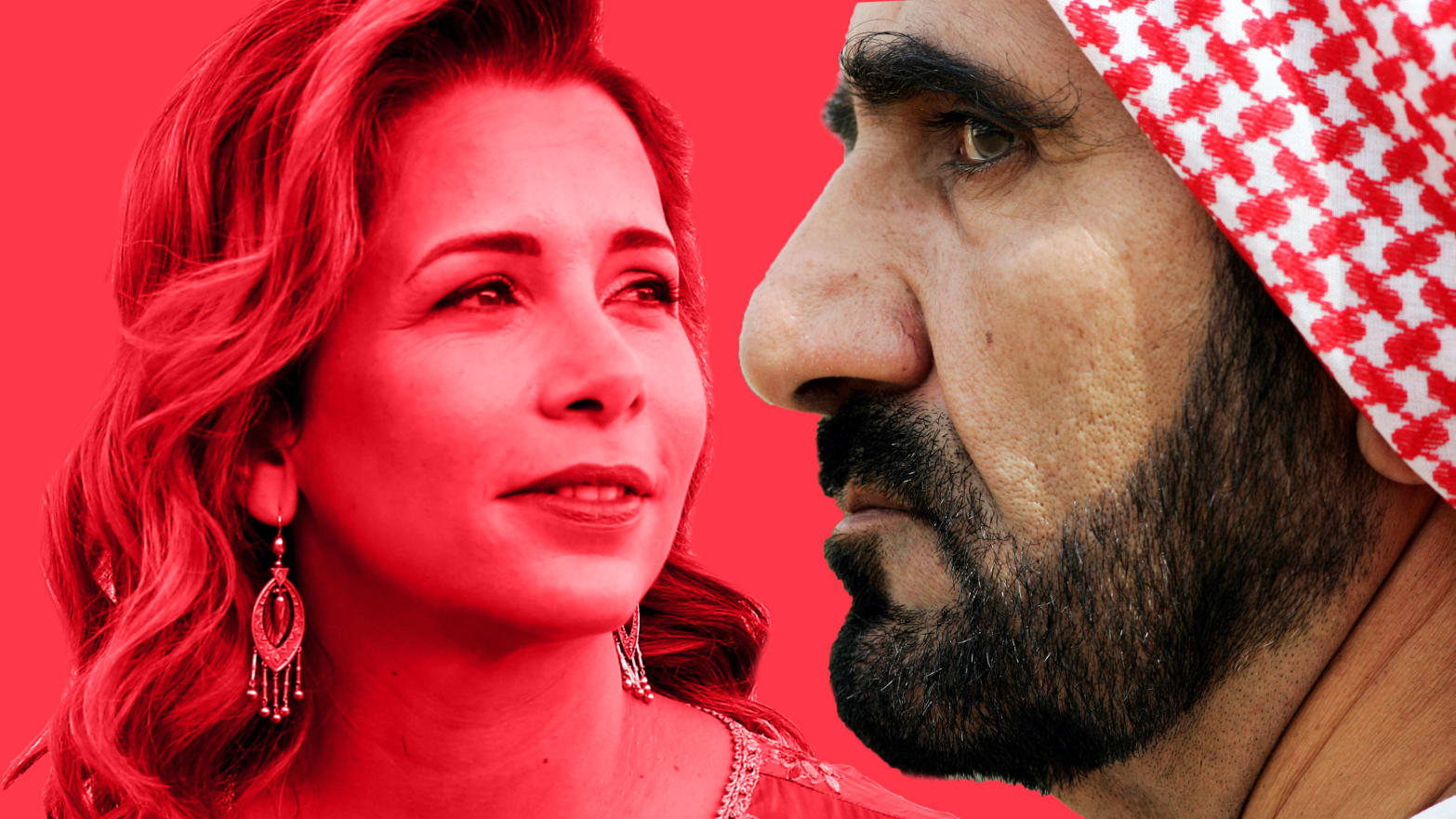Sheikh Mohammed bin Rashid Al Maktoum, the ruler of Dubai and one of the world’s richest men, has written a furious poem denouncing treachery and betrayal after his wife, Princess Haya bint Al Hussein, the daughter of the late King of Jordan and sister of the present king, secretly fled to Europe with their son Zayed, 7, and daughter Al Jalila, 11.
Haya is believed to have initially sought asylum in Germany, and sources say her application has been approved in principle.
However, she is also said to be seeking sanctuary in the U.K., with sources telling The Daily Beast her preference is to live in London, where she is currently said to be residing at a secret location.
The flight of Haya will inevitably draw comparisons with the failed attempt by bin Rashid’s daughter, Princess Shiekha Latifa, to flee Dubai last year. Latifa tried to get out, but was intercepted at sea off India and returned the United Arab Emirates. She had previously recorded a YouTube video in which she criticized her father and the restrictions she lived under.
Haya was criticized after she helped Dubai spin the Latifa story, appearing alongside former Irish President Mary Robinson and a dazed and listless Latifa after her capture to show she was unharmed.
Bin Rashid, 69, is known as a poet in his native land and frequently marks great occasions of state, and family events such as weddings, in verse.
Although his poetic skills have often been the subject of private derision, few in the UAE’s closeted world have ever dared to criticize his musings.
The new poem, which appears to have been written by the prince in outrage at his wife’s decision to abscond with their son and daughter is particularly awful, even by his standards.
Entitled “You Lived and You Died,” the poem is a furious meditation on betrayal, in which the poet accuses the unnamed subject:
“You betrayer, you betrayed the most precious trust, and your game has been revealed.
“Your days of lying are over and it doesn’t matter what we were and what you are.”
Appropriately given his obsession with horses ( bin Rashid is the founder of Godolphin, the world’s biggest and most powerful horse breeding and racing conglomerate), the verse is rich in equine imagery, with Rashid writing in one section: “You let the reins on your horse go free.”
The poem concludes with a dramatic denunciation: “You no longer have any place with me/ Go to who you have been busy with!/ And let this be good for you; I don’t care if you live or you die.”
Asked if the poem sounded as bad in Arabic as it did in translation, a source told The Daily Beast: “It’s actually worse.”
Sources say bin Rashid was encouraged by his eldest sons to write the poem, which was shared initially in an Insatgram post by a trusted and senior adviser and has since swept around Arabic-language social networks. These sons are the product of his marriage to his first and senior wife, and they are reported to hold great animosity toward Haya, as bin Rashid more or less abandoned his senior wives when he married Haya (he has at least five and possibly as many as seven wives and acknowledges 23 children).
Questions were first raised about the status of the relationship after Haya was observed not to be at her husband’s side at the British race meeting Royal Ascot this month.
It then emerged that bin Rashid and Sheikh Mohamed bin Zayed, ruler of Abu Dhabi and president of the entire United Arab Emirates (of which Dubai is a part), had made an unscheduled visit to Germany prior to Ascot, which, sources say, was part of an attempt to negotiate a solution with Haya.
While there is no longer any serious hope she will return to the desert country, the word now is that bin Rashid will allow a civil divorce from Haya and not fight to have her brought back to the UAE.
This is a sign, some believe, that regionally the UAE’s power is fading and it has no appetite for a propaganda war over the relationship with Jordan, where Haya, as the late king’s daughter and a prominent philanthropist, is a national icon.
In return for leaning on Haya to keep embarrassing details about Dubai quiet, sources say, Jordan is likely to politely request vast influxes of capital investment, which they felt they were promised when the marriage first took place but did not materialize as hoped. Haya’s brother, King Abdulah II, is, however, innately cautious, and will be unlikely to overplay his hand—some 200,000 Jordanians work in the UAE and the remittances sustain Jordan’s economy.
Relations between the UAE and Jordan are strong; Jordan has, for example, backed the Emirates in its blockade of Qatar. Sources say Haya may have fled to Europe rather than to her own country to spare her family from the pressure that would inevitably be brought to bear by the emirates to send her back.
However, some believe the affair, and the ill-advised poem, may signal the beginning of the end of bin Rashid’s remarkable reign of Dubai, and provide a rallying point for Emiratis who would like to shift him off the throne in favor of the young crown prince, who they hope might revive the emirate’s fortunes: Growth in gross domestic product slowed to 1.9 per cent last year, its slowest rate of expansion since 2010.
Radha Stirling, from the activist group Detained in Dubai, told The Daily Beast: “We have received multiple reports regarding the story of Princess Haya from sources close to the governments in Jordan and the UAE, all of which indicate that she has sought political asylum in Germany.
“We cannot comment on the veracity of these reports, but such an event would clearly represent a powerful indictment against the UAE and against Sheikh Mohammed bin Rashid personally, as well as have potentially dramatic repercussions on the relationships between the countries involved.”
Queries to official bodies drew a blank, with a spokesperson for the British government saying they could not comment on individual cases. The German Bundestag did not reply to a query and the UAE government did not respond to a request for comment on the princess’ alleged appeal for asylum.
Editor’s Note: An earlier version of this article misrepresented Islamic law vis-à-vis the issue of custody of children. The reference has now been removed.

